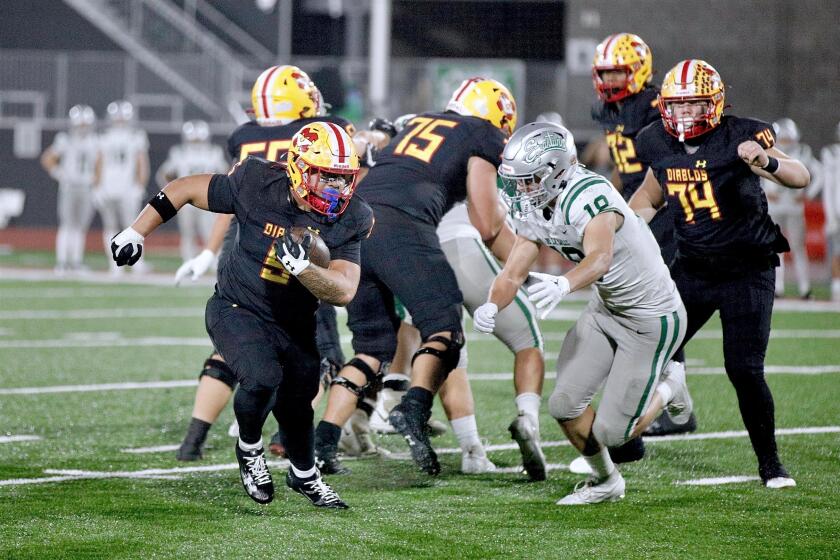Caught in a Pickle : Farmhands Muse: Play Now, Pay Later?
MELBOURNE, Fla. — Mike Sims riffles through his mental Rolodex in search of words to describe his personal tumult during the first week of spring training.
He whips out a photo identification card given to each player because of security concerns. Never had one in three years of pro ball.
Everyone correctly assumed the big-league players’ strike would complicate matters this spring, but Sims and many minor league mates in the Florida Marlin organization never thought it would affect them directly.
“It’s a mess,” Sims said. “Complete chaos.”
On the field, everything seemed in order. The Marlins ran through drills with nary a hitch, everybody proceeded expeditiously from one station to the next. When the whistle blew to signal day’s end, though, disorder reigned in nearly every quarter.
It’s hardly an overstatement, even for unassuming guys like Sims. For a week, almost every minor leaguer in camp was looking over his shoulder with dread.
The trickle-down effect of the strike initially wasn’t expected to impact guys like Sims, 24, who played at Alemany High and Cal State Northridge. Nor a couple of his teammates from last summer’s Class A club in Brevard County, Fla., pitchers Dan Chergey and Mitch Bowen, both area products.
“None of this (strike) stuff should have much to do with us,” said Bowen, who played at St. Francis High. “I just want to bust my butt every day and make an impression.”
In a perfect world, the trio would be battling for promotions to double-A ball. But imperfections abound this spring, a fact borne out by the presence in camp of numerous replacement players, one of whom hasn’t pitched in 11 years. Florida is filled with blue-haired folks, and some are now wearing baseball uniforms.
In Marlin camp, like most others, each day brings a new wrinkle. Things began to get particularly messy for farmhands when, three days into camp, the players’ union announced that minor leaguers who participate in spring exhibition games will be considered strikebreakers in most circumstances.
Four days earlier, Marlin minor leaguers were told during orientation that some might be asked to serve as replacement players when the, well, irregular season begins in April.
Double-A aspirants and double-whammy victims. The implications were staggering, particularly for guys in the lower classifications.
Marlin brass stated at the outset of camp that top prospects would not be used as replacement players. If the prospects reach the majors down the road, you see, they’d be ostracized by union members. Can’t risk that.
For minor leaguers, being asked to serve as replacements was viewed as the kiss of death. They were sure of it. It meant the organization had no long-term plans for them beyond serving as fill-ins during the strike. It meant management figured the players had no chance of reaching the majors on merit.
“If they ask you, it means they have no place for you in the organization,” Sims said. “I’d take that as a sign to get on with my life. Time for Plan B.”
For several anxiety-filled days, players weighed their futures and hoped not to make eye contact with anyone involved with player personnel. Anybody who made the opening-day replacement roster stood to make $30,000, which obviously factored into the equation.
Sims, Chergey and Bowen, like thousands of players in other camps, were clearly in harm’s way. They began rehearsing their responses in case the fateful tap on the shoulder ever came.
Said Bowen: “What’s my future? Do I have any chance of moving up? Can you trade me to a team that can use me?”
Sims tried gallows humor.
“First, I’d be heartbroken, then I’d have to think about it,” Sims said, slowly breaking into a self-effacing grin. “Then I’d ask, ‘Is that direct deposit?’ ”
In a typical year, players like Sims, Chergey and Bowen report to camp and all but beg to be included in exhibition games. That way, the brass get a chance to evaluate their skills.
“That’s something minor leaguers have done forever,” said Frank Wren, the Marlins’ assistant general manager. “The highlights of spring training are when young kids get a chance to shine.”
The Marlins, like many other clubs, said players who decline to participate in exhibitions will be accommodated.
“If they tell us that, you hope they’re being honest,” Chergey said.
Who’s to say there won’t be repercussions? Organizations are in a bad position too. Everybody is making up the rules as they go along.
“We’ve never been in this situation before,” said John Hart, general manager of the Cleveland Indians. “Legally, if we had to, we could probably force them to play (in exhibitions). Will we? I doubt it.
“But if one kid doesn’t play, it sure might open the door for another.”
Arm-twisting on one side.
Coercion on the other.
“Both sides are trying to influence the players,” said Chergey, a Thousand Oaks High graduate. “Both are trying to manipulate us.”
No doubt. Some teams have taken a hard-line approach. The Cincinnati Reds said minor leaguers would participate in exhibitions or be sent home. The New York Yankees took a similar stance and last Thursday sent packing four farmhands who refused to play. Guess this is why they call it hardball.
Farmhands wonder what they did to deserve this fate. The majority aren’t even in the union.
“What has the union done for us?” Bowen said. “I don’t make those salaries.”
They earned their pay in 1994. Sims, whose defensive skills are the stuff of legend at Northridge, batted .248 but was named to the Florida State League all-star team. Bowen, a 22-year-old right-handed reliever, was 7-3 with an earned-run average of 3.00.
Chergey, 24, who owns a slew of pitching records at Cal Poly San Luis Obispo, had an ERA of 1.71 and nine saves as the team closer. He was briefly promoted to triple-A Edmonton.
Not top prospects, perhaps, but hardly stiffs , either. The trio wondered aloud what would happen if they sauntered up to management and asked for a clarification of their situations. Bowen seriously considered it. Sims couldn’t even handle the thought.
“I’ll live with the suspense,” Sims said. “I don’t want to know what their plans are.”
After a week in the lurch, the smoke cleared slightly over the weekend.
The club came up with a compromise. John Boles, the team’s minor-league director of player development, spoke to Marlin farmhands individually on Saturday.
Every player was asked two questions. First, are you willing to serve as a replacement player? Second, will you play in exhibition games?
While at Edmonton, Chergey said he spoke at length with former big leaguers about the union and its platform. He responded to both questions in the negative.
Sims and Bowen each said no to the first question, yes to the second.
Were there any correct answers?
For Sims and Bowen, the need to make an impression ultimately outweighed any possible repercussions from the union. Chergey feels the team already has a solid grasp of his capabilities.
“You roll the dice,” Sims said, “and see what happens.”
More to Read
Go beyond the scoreboard
Get the latest on L.A.'s teams in the daily Sports Report newsletter.
You may occasionally receive promotional content from the Los Angeles Times.










